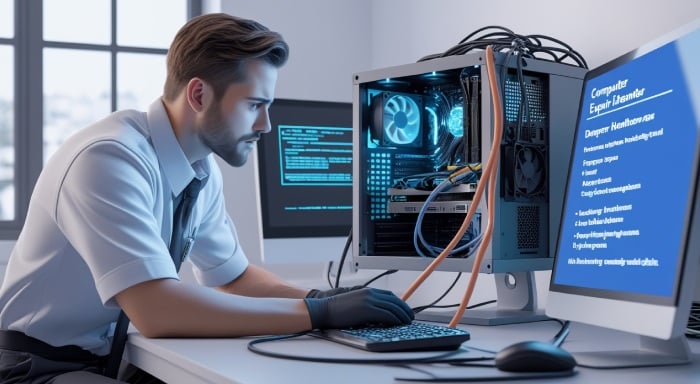Computers are now as important as oxygen. They are amazing devices that basically govern our lives. They're so small and light now that you can take them with you practically anywhere. But, you get so used to them that it is a disaster when they surprise you—they stop working.
Weird error messages, slow systems, not turning on, technical problems, and the list goes on and on. While some problems are easy to fix, others require a professional. Stay tuned to know when you should call a professional to fix your computer. In this blog, you will also learn about issues you can resolve on your own and issues that need a more professional handling.
Common Computer Issues You Can Fix Yourself
Not all problems require a repair shop. Some are simple enough to handle on your own.
1. Slow Performance
A sluggish computer can often be fixed with a little maintenance. Try these steps first:
- Restart your computer (yes, the classic “turn it off and on again” actually works!).
- Delete unnecessary files and clear cache.
- Run a virus scan to check for any issues.
- Make sure your software and drivers are updated.
- If your system is having problems juggling through numerous tasks, adding more RAM can be helpful.
- You can also remove redundant programs that might be causing the slowness of your computer.
If it’s still running super slow after all this, it might be time to call a pro.
2. Overheating and Loud Fans
Computers get hot, but if the heat is getting out of control, it’s a sign of a crisis. Here’s what you can do:
- Clean the dust from vents and fans.
- Ensure your laptop or desktop is placed on a flat, hard surface. They need proper ventilation.
- Close unused programs.
- Check if thermal paste needs to be reapplied to your CPU.
- For laptops, you can consider adopting a cooling pad to minimize heating.
Even after following all these tips, if the overheating problem still has not been solved, then there might be a lingering hardware problem. In such a scenario, it is worthwhile to rely on a professional to have a look.
3. Internet Connectivity Problems
When your internet drops, don’t panic. Try this:
- Turn your modem and router off, then on again.
- Try using a wired connection to see if the Wi-Fi is the issue.
- Find out whether everything is updated or not.
- If that doesn’t help, reset your network settings.
If the problem still isn’t fixed, your hardware might need repair.
Signs It’s Time to Call a Professional
Sometimes, DIY fixes just won’t cut it. Here’s when you should let an expert step in.
1. Frequent Crashes or Blue Screens
A random crash every now and then isn’t a big deal, but if your computer keeps freezing or showing the dreaded Blue Screen of Death (BSOD), it’s a red flag. This could mean:
- Failing hardware, like RAM or the hard drive.
- Corrupted system files.
- A deep-rooted malware infection.
- Overheating leads to system instability.
Since these issues require diagnosing hardware and software at a deeper level, it’s best to get professional help.
2. Unusual Noises
If your computer starts making clicking, grinding, or beeping noises, don’t ignore it. Some possible causes include:
- A failing hard drive (clicking sound).
- A malfunctioning cooling fan (grinding sound).
- Hardware errors (beeping at startup).
- A power supply unit fails, which can result in buzzing sounds.
Continuing to use your computer when it makes these sounds could lead to further damage. Get it checked before things get worse.
3. Liquid Spills
Accidentally spilled coffee on your laptop? A lot of people make the mistake of ignoring the spilled coffee and continue working. Here’s what to do immediately:
- Turn it off and unplug it.
- Remove the battery if possible.
- Dry it upside down on a towel and let it sit for at least 24 hours.
- Take it to a professional to clean internal components and prevent corrosion.
Even if your computer turns on afterward, liquid damage can cause long-term issues.
4. Strange Pop-Ups and Performance Issues
If you’re seeing constant pop-ups, fake antivirus warnings, or experiencing slow performance despite no visible issues, your computer might have malware. A professional can:
- Perform deep virus and malware scans.
- Remove stubborn infections.
- Reinstall your operating system if needed.
When Repairs Might Not Be Worth It
We admire people who refuse to buy a new computer at the first sign of trouble because that is not the most sustainable or cost-effective way to go, but sometimes we just have to say goodbye. Here’s when it’s better to replace it instead of repairing it.
1. Your Computer Is Old
As computers get older, they start slowing down and struggle to run newer programs. If your computer is several years old and you’re facing expensive repairs, it might be a better idea to just buy a new one instead.
2. The Cost of Repair Is Too High
If fixing your computer costs more than half of what a new one would, it's probably not worth it. Things like replacing the motherboard or screen can be really expensive. Buying a new one might be a better choice.
3. Your Computer Isn’t Powerful Enough
No matter how hard you try to play a game smoothly or edit a video, your computer just won't listen. The screen freezes constantly, it crashes, not to mention it takes forever to load. Now, it feels a repair might not suffice, it is important to consider upgrading the entire system.
The stronger and more powerful your system is, the more effectively you’ll be able to do things that take a lot of power.
How to Choose the Right Computer Repair Professional
If you’ve decided to get professional help, here’s how to find someone reliable.
1. Look for Certifications and Experience
A good repair technician should have years of hands-on repair experience and certifications, such as:
- CompTIA A+ Certification
- Microsoft Certified Professional (MCP)
- Apple Certified Mac Technician (if you have a Mac)
These indicate that the technician knows what they’re doing.
2. Check Reviews and Recommendations
Before you hand over your device, check out online reviews or ask friends for recommendations. A good repair shop will have more than solid feedback from people who’ve used their service before.
3. Ask About Warranty and Pricing
Before you get a repair done, here are a few things you should ask:
- What is the overall expense of the repair?
- Do they provide you with a warranty for their work or not?
- What is the overall repair duration needed for the problem?
- Is the repair service relying on quality replacement parts from credible brands?
A trustworthy repair service will be upfront about all of this, making you feel good about your decision.
Who You Gonna Call?
You do not always need an expensive team to get your computer up and running. If your computer needs fixing, consider Locanto’s computer repair services. Not only is it free-to-access but it is also an easy way to look for skilled and certified professionals whenever you need them.
Essentially, your decision falls down to determining what works for you and what does not. Can you resolve your computer issue on your own? Is replacing parts a better option? If the computer is not fixable, do you have the requisite budget to buy a new computer? We know that new doesn't mean better, so it’s worth taking a closer look at your options.If you do end up fixing it, make sure you find a professional who really knows what they're doing and is transparent about their prices and deadlines. Whatever method you adopt, making the best call can help you start doing what you need to do without needing any additional expense or hassle.








